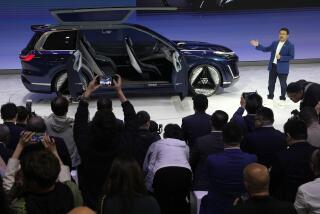China curbs investments in auto industry
BEIJING — China unveiled curbs Tuesday on surging investment in its auto industry, extending controls already imposed in other fields in an effort to cool off an economic boom that Beijing worries could ignite a financial crisis.
It wasn’t clear how the controls would affect foreign automakers that are setting up factories in China, the world’s third- largest auto market, where sales are growing at double-digit annual rates.
Communist authorities are trying to slow an investment boom in such industries as real estate, textiles, steel and auto manufacturing that they worry could spark inflation or a debt crisis.
Under the new controls, automakers that want to expand their factories have to show that sales exceed 80% of last year’s authorized output, according to China’s main planning agency, the National Reform and Development Commission.
Auto sales are expected to grow 22% this year to 7 million vehicles and expand by another 15% next year, the main association for Chinese automakers said last week.
But industrywide, production was only 71.5% of capacity last year, prompting fears of a glut, the Chinese planning agency said on its website. It said more than 100 companies were producing cars in China.
“Structural surplus is the basic characteristic of the current auto industry’s production surplus, and is the major existing problem for the development of the current auto industry,” the agency said.
All of the world’s major automakers have Chinese factories, including General Motors Corp., Ford Motor Co., DaimlerChrysler, Volkswagen, Toyota Motor Corp. and Nissan Motor Corp.
The latest controls appear to have a bigger possible effect on foreign investors than earlier measures, which targeted industries in which the main competitors were Chinese.
China’s economy is expected to grow 10.5% this year, driven by investment in factories and other fixed assets that the government says soared by 26.6% in the first 11 months of the year.
The government has raised interest rates twice this year, imposed curbs on construction and tightened standards for approval of industrial projects in an effort to contain investment.
In August, the government ordered a review of the auto, steel, textile and other industries to stop unauthorized projects and slow down investment.
But Ma Kai, chairman of the National Reform and Development Commission, was quoted this month by state media as saying the “relentless expansion has yet to be stopped.”
A government economic blueprint for 2007 announced this month said controls on land use and other economic affairs would be kept in place to contain the investment surge.






